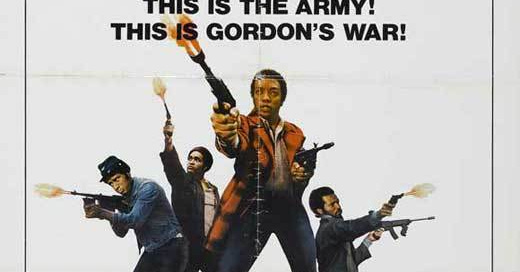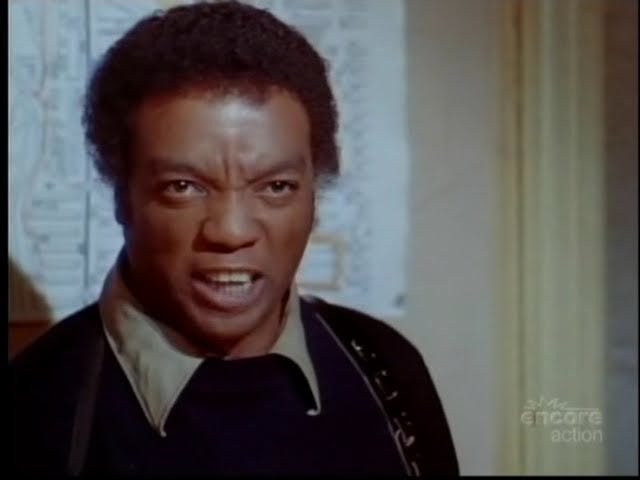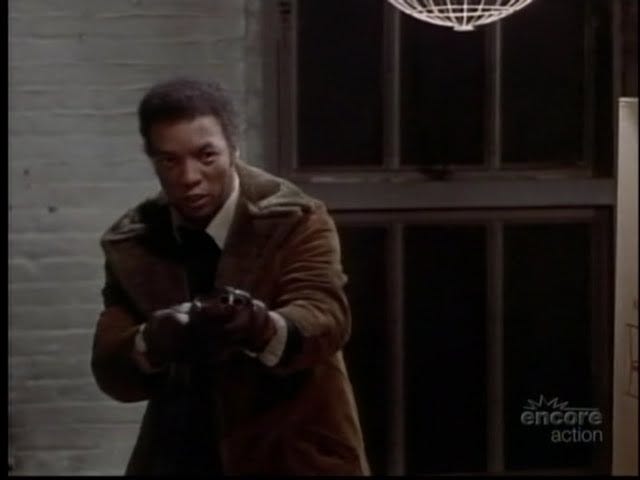Gordon’s War
Written by Howard Friedlander and Ed Spielman
Directed by Ossie Davis
1973
Blaxploitation movies had kind of an ambivalent attitude toward crime, although that really means that different filmmakers had different attitudes and approaches. Most movies in the genre that took place in urban settings featured characters that mostly operated outside the bounds of the law, with some featuring characters with a sort of morally grey stance (Trouble Man, Hit Man) and others depicting the problems of a society where the weak tend to get preyed upon by the powerful (Across 110th Street), as well as a few that appeared to serve as outright celebrations of criminals (Super Fly, The Mack). But by 1973, it seems like more and more of these movies were recognizing the problems that plagued urban Black communities, and perhaps in response to criticism of the Blaxploitation genre, some of them began taking a stand against types of crime that are particularly harmful, specifically those related to drugs.
Gordon’s War appears to be an attempt to weld Blaxploitation action to an anti-drug message, and while it can’t really be called realistic in its depiction of the fight against the drug trade, it at least approaches the idea somewhat seriously. A lot of what makes it work probably comes from director Ossie Davis, who was one of the more respectable people involved in the Blaxploitation scene. He was one of the people who got the whole genre started with Cotton Comes to Harlem, but before that, he had been working as an actor on Broadway, on TV, and in movies, possibly being second only to Sidney Poitier as the Black performer that people recognized as a capital-A Actor. Here, he gets some good performances out of his cast, while also showing a facility for exciting action.
The movie stars Paul Winfield (Sounder) in the title role as a Vietnam vet who returns from the war to find that his wife has fallen into drug addiction and died of an overdose. While he initially decides to take revenge on the drug dealer and pimp who got her hooked on dope, the immediate retaliation he receives after beating the guy half to death makes him realize that drugs have become enough of a problem in Harlem that something needs to be done about it. So he recruits a few of his army buddies to wage the titular war, with the intent of driving drugs out of the community altogether.
While the idea that a small group (only four men!) could take on a vast network of dealers, distributors, and enforcers is kind of ridiculous, the movie tries to make it seem possible, depicting the efforts that Gordon and his compatriots use to disrupt the drug trade, stop dealers from selling to people, and even create an atmosphere where drugs are unwelcome. Notably, there’s absolutely no indication that they even considered working with law enforcement. The filmmakers clearly understood that the police have little interest in actually doing anything about the problem, and they knew that their audience most likely wouldn’t be interested in any lame attempts to make it seem like the heroes are cooperating with the authorities, so they basically treat Harlem as a lawless territory where vigilante justice is the only type of justice that anyone will ever see.
The movie spends a lot of time watching Gordon and his men enact their plans, starting with performing reconnaissance in various neighborhoods to learn about the movements of different drug dealers and the supply lines as dope is distributed. It’s uncertain where they get their weapons and other equipment, but they do use some infrared night-vision scopes that must have seemed incredibly high-tech at the time. Then, they use intimidation tactics to get information from some of the dealers while also convincing them to leave town. They also try to eliminate some of the drug dens by forcing local hotels to clean up and stop providing short-term services where people can engage in drug deals or shoot up.
A lot of this activity seems to be pretty low-stakes, including bits in which one of the men, played by Carl Lee (Super Fly), seems to really enjoy getting into character as he goes undercover. In one scene, he meets up with a junkie friend of his from Vietnam, accompanying him to a drug den where they can get high, but then pretending to foam at the mouth and die in order to convince the other junkies that the drugs have been tainted with rat poison.
Things eventually kick into a higher gear when Gordon’s army starts to actively disrupt the drug trade, including following a courier (played by Grace Jones!) to a location where a bunch of topless women are packaging large amounts of heroin into small baggies to be sold. After they confiscate the drugs and destroy the operation, they get the attention of Harlem’s main drug kingpin, Spanish Harry (Gilbert Lewis, who was also in Across 110th Street and Cotton Comes to Harlem). This leads to a big showdown after Harry gets some orders from his own bosses (a bunch of white guys sitting in a boardroom, which is a sharp bit of commentary about who really benefits from the oppression of Black people).
The movie eventually turns into a series of action scenes, with Gordon and his men foiling a plot to bomb their headquarters and fending off various attacks. One of them doesn’t make it, getting assassinated while he’s in bed with a white woman, but Gordon takes out an attempted killer with a cool use of some aerosol deodorant to create a fireball. There’s a final confrontation with Harry in which Gordon and his two remaining soldiers seem to overcome the bad guys far too easily, but it leads to a pretty cool chase scene that’s shot in an exciting style, featuring some POV shots from the motorcycle Harry is riding and ending on a nice freeze-frame.
This is all fine for a fairly low-budget action movie, although there’s a bit of a disconnect between the desire to confront a serious problem that’s affecting people in the inner city and the need to provide entertaining on-screen action. It’s nice that the filmmakers put some thought into how an actual war on drugs might be conducted, but they still needed to create a single villain who can be overcome to achieve a happy ending, which isn’t at all true-to-life. It’s hard to complain about a movie that provides some fun scenes of violence, a few enjoyable performances, and some decent music (including a soundtrack by the group Badder Than Evil and the songs “Child of Tomorrow” by Barbara Mason and “Come on and Dream Some Paradise” by The New Birth). I would definitely prefer something that doesn’t make it seem like the drug problem is an issue that could be easily solved by a few determined people, but something like this is probably as serious as that topic can be treated in the mass entertainment of the 1970s. Oh well, sometimes you just gotta enjoy what you’re given.
Blaxploitation Education index:
UpTight
Cotton Comes to Harlem
Watermelon Man
The Big Doll House
Shaft
Sweet Sweetback’s Baadasssss Song
Super Fly
Buck and the Preacher
Blacula
Cool Breeze
Melinda
Slaughter
Hammer
Trouble Man
Hit Man
Black Gunn
Bone
Top of the Heap
Across 110th Street
The Legend of N***** Charley
Don’t Play Us Cheap
Shaft’s Big Score!
Non-Blaxploitation: Sounder and Lady Sings the Blues
Trick Baby
The Harder They Come
Black Mama, White Mama
Black Caesar
The Mack
Book of Numbers
Charley One-Eye
Ganja & Hess
Savage!
Coffy
Shaft in Africa
Super Fly T.N.T.
Scream Blacula Scream
Cleopatra Jones
Terminal Island








"Harlem as a lawless territory where vigilante justice is the only type of justice that anyone will ever see...."
That idea is based on reality only up to a point. The biggest exception was/is the affluent Sugar Hill neighborhood, the home of Harlem's more affluent and famous residents. But the police, as many of us now know well, tend to treat all Blacks regardless of socioeconomic status in a lowly fashion, so Gordon knew they wouldn't help. But being a Vietnam vet clearly worked in his favor, as it did for Jim Brown's Slaughter earlier.
Once upon a time, Harlem was a thriving and influential part of New York, but by the 70s that time had largely passed. That the filmmakers also got correct.
(RIP Ossie Davis).